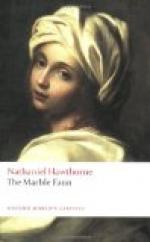The handmaid of Raphael, whom she loved with a virgin’s love! Would it have been worth Hilda’s while to relinquish this office for the sake of giving the world a picture or two which it would call original; pretty fancies of snow and moonlight; the counterpart in picture of so many feminine achievements in literature!
CHAPTER VII
BEATRICE
Miriam was glad to find the Dove in her turret-home; for being endowed with an infinite activity, and taking exquisite delight in the sweet labor of which her life was full, it was Hilda’s practice to flee abroad betimes, and haunt the galleries till dusk. Happy were those (but they were very few) whom she ever chose to be the companions of her day; they saw the art treasures of Rome, under her guidance, as they had never seen them before. Not that Hilda could dissertate, or talk learnedly about pictures; she would probably have been puzzled by the technical terms of her own art. Not that she had much to say about what she most profoundly admired; but even her silent sympathy was so powerful that it drew your own along with it, endowing you with a second-sight that enabled you to see excellences with almost the depth and delicacy of her own perceptions.
All the Anglo-Saxon denizens of Rome, by this time, knew Hilda by sight. Unconsciously, the poor child had become one of the spectacles of the Eternal City, and was often pointed out to strangers, sitting at her easel among the wild-bearded young men, the white-haired old ones, and the shabbily dressed, painfully plain women, who make up the throng of copyists. The old custodes knew her well, and watched over her as their own child. Sometimes a young artist, instead of going on with a copy of the picture before which he had placed his easel, would enrich his canvas with an original portrait of Hilda at her work. A lovelier subject could not have been selected, nor one which required nicer skill and insight in doing it anything like justice. She was pretty at all times, in our native New England style, with her light-brown ringlets, her delicately tinged, but healthful cheek, her sensitive, intelligent, yet most feminine and kindly face. But, every few moments, this pretty and girlish face grew beautiful and striking, as some inward thought and feeling brightened, rose to the surface, and then, as it were, passed out of sight again; so that, taking into view this constantly recurring change, it really seemed as if Hilda were only visible by the sunshine of her soul.
In other respects, she was a good subject for a portrait, being distinguished by a gentle picturesqueness, which was perhaps unconsciously bestowed by some minute peculiarity of dress, such as artists seldom fail to assume. The effect was to make her appear like an inhabitant of pictureland, a partly ideal creature, not to be handled, nor even approached too closely. In her feminine self, Hilda was natural, and of pleasant deportment, endowed with a mild cheerfulness of temper, not overflowing with animal spirits, but never long despondent. There was a certain simplicity that made every one her friend, but it was combined with a subtile attribute of reserve, that insensibly kept those at a distance who were not suited to her sphere.




